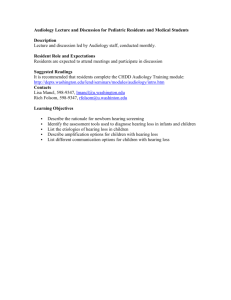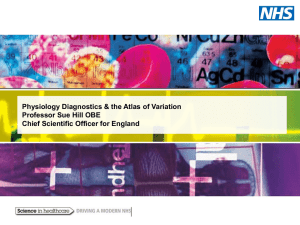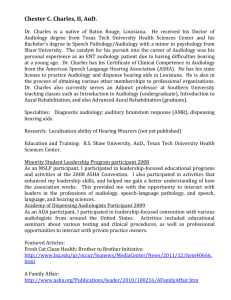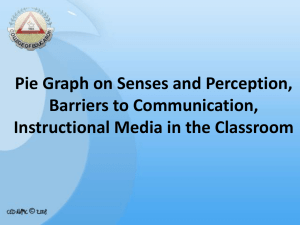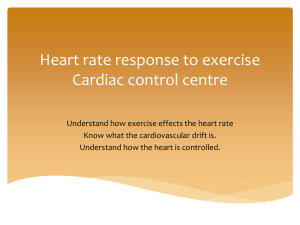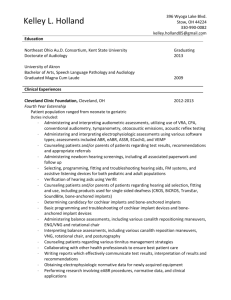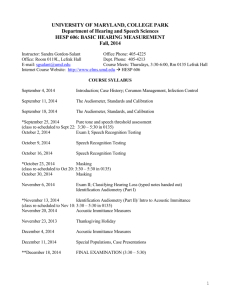Course Code Course Title Descriptions Alternative Titles (may
advertisement
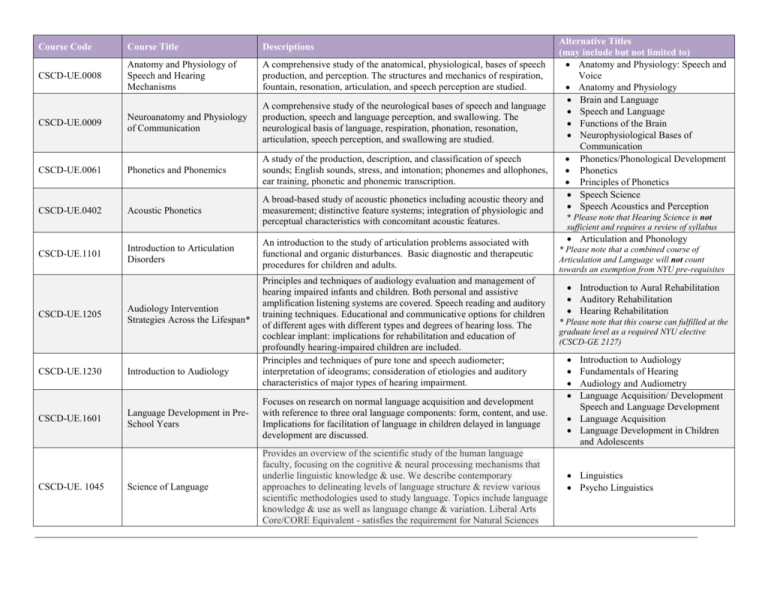
Course Code Course Title Descriptions CSCD-UE.0008 Anatomy and Physiology of Speech and Hearing Mechanisms A comprehensive study of the anatomical, physiological, bases of speech production, and perception. The structures and mechanics of respiration, fountain, resonation, articulation, and speech perception are studied. CSCD-UE.0009 Neuroanatomy and Physiology of Communication A comprehensive study of the neurological bases of speech and language production, speech and language perception, and swallowing. The neurological basis of language, respiration, phonation, resonation, articulation, speech perception, and swallowing are studied. CSCD-UE.0061 Phonetics and Phonemics A study of the production, description, and classification of speech sounds; English sounds, stress, and intonation; phonemes and allophones, ear training, phonetic and phonemic transcription. CSCD-UE.0402 Acoustic Phonetics A broad-based study of acoustic phonetics including acoustic theory and measurement; distinctive feature systems; integration of physiologic and perceptual characteristics with concomitant acoustic features. CSCD-UE.1101 Introduction to Articulation Disorders An introduction to the study of articulation problems associated with functional and organic disturbances. Basic diagnostic and therapeutic procedures for children and adults. Principles and techniques of audiology evaluation and management of hearing impaired infants and children. Both personal and assistive amplification listening systems are covered. Speech reading and auditory training techniques. Educational and communicative options for children of different ages with different types and degrees of hearing loss. The cochlear implant: implications for rehabilitation and education of profoundly hearing-impaired children are included. Principles and techniques of pure tone and speech audiometer; interpretation of ideograms; consideration of etiologies and auditory characteristics of major types of hearing impairment. CSCD-UE.1205 Audiology Intervention Strategies Across the Lifespan* CSCD-UE.1230 Introduction to Audiology CSCD-UE.1601 Language Development in PreSchool Years Focuses on research on normal language acquisition and development with reference to three oral language components: form, content, and use. Implications for facilitation of language in children delayed in language development are discussed. Science of Language Provides an overview of the scientific study of the human language faculty, focusing on the cognitive & neural processing mechanisms that underlie linguistic knowledge & use. We describe contemporary approaches to delineating levels of language structure & review various scientific methodologies used to study language. Topics include language knowledge & use as well as language change & variation. Liberal Arts Core/CORE Equivalent - satisfies the requirement for Natural Sciences CSCD-UE. 1045 Alternative Titles (may include but not limited to) Anatomy and Physiology: Speech and Voice Anatomy and Physiology Brain and Language Speech and Language Functions of the Brain Neurophysiological Bases of Communication Phonetics/Phonological Development Phonetics Principles of Phonetics Speech Science Speech Acoustics and Perception * Please note that Hearing Science is not sufficient and requires a review of syllabus Articulation and Phonology * Please note that a combined course of Articulation and Language will not count towards an exemption from NYU pre-requisites Introduction to Aural Rehabilitation Auditory Rehabilitation Hearing Rehabilitation * Please note that this course can fulfilled at the graduate level as a required NYU elective (CSCD-GE 2127) Introduction to Audiology Fundamentals of Hearing Audiology and Audiometry Language Acquisition/ Development Speech and Language Development Language Acquisition Language Development in Children and Adolescents Linguistics Psycho Linguistics ASHA Course Descriptions Biological Science Acceptable courses in biological sciences should emphasize a content area related to human or animal sciences (e.g., biology, human anatomy and physiology, neuroanatomy and neurophysiology, human genetics, veterinary science). Physical Science Course work in physical sciences should include physics or chemistry. Statistics Acceptable courses include any college-level, stand-alone statistics course that is computational versus remedial, historical, or methodological in nature. Social and Behavioral Science Acceptable courses in social/behavioral sciences should include psychology, sociology, anthropology, or public health. Foreign Language A minimum of 3-credits of course work in a language other English must be completed. In addition to foreign languages, American Sign Language can fulfill this requirement. The combination of the biological science, physical science, statistics, and social/behavioral science must equate to a minimum of 12-credits. Research methodology courses in communication sciences and disorders (CSD) may not be used to satisfy the statistics requirement. Courses in biological and physical sciences specifically related to communication sciences and disorders (CSD) may not be applied for certification purposes to this category unless the course fulfills a university requirement in one of these areas. In addition to transcript credit, applicants may be required by their graduate program to provide further evidence of meeting this requirement.
